A community approach to an inclusive future
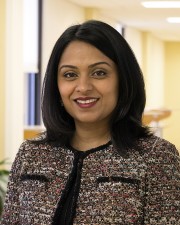 Over the last year, a new and more powerful discourse around issues of inequality, identity and anti-racism has emerged across the country and the University of Michigan. At the School of Nursing, students, faculty and staff have coalesced around efforts to create a more inclusive culture and chart a new path forward. By considering the nursing curriculum in new contexts and creating platforms to empower diverse voices, many in the School of Nursing community believe that the adversity faced in 2020 can inform meaningful change.
Over the last year, a new and more powerful discourse around issues of inequality, identity and anti-racism has emerged across the country and the University of Michigan. At the School of Nursing, students, faculty and staff have coalesced around efforts to create a more inclusive culture and chart a new path forward. By considering the nursing curriculum in new contexts and creating platforms to empower diverse voices, many in the School of Nursing community believe that the adversity faced in 2020 can inform meaningful change.
“It’s about community development, forming a shared identity and creating spaces of belonging,” said the U-M School of Nursing’s Chief Inclusion Officer Rushika Patel, Ph.D. “Having a diversity of actors leading our approach to this work helps make it relevant to the students, faculty and staff who are most affected by it, giving them an opportunity to create the transformation they want to see.”
Patel assumed her role as the school’s first chief inclusion officer in 2017. By developing resources, programs, events and initiatives, she and her office are committed to creating effective outlets to ensure every U-M School of Nursing stakeholder has the ability to effect institutional change.
Below, we’ve highlighted a few of the individuals and endeavors working toward a more inclusive future at the School of Nursing and across the university.
Nursing student forms the Future Black Healthcare Professionals
After earning her first bachelor’s degree in neurobiology and physiology, Rebecca Abaddi changed the course of her career and found her place in nursing. While studying in the Primary Care Pediatric Nurse Practitioner DNP program at the U-M School of Nursing and practicing as an infectious disease nurse at Henry Ford Hospital, Abaddi struggled to find her place on campus as a Black woman in health care.
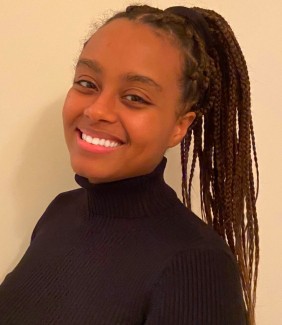 “I wanted to join a diverse organization with an interdisciplinary focus where Black students in health programs could connect with one another. All of us, whether going into medicine, nursing, social work or another health related field, we’ll all be working with each other. It seemed like there was a need for this space, so I decided to create it,” she explained.
“I wanted to join a diverse organization with an interdisciplinary focus where Black students in health programs could connect with one another. All of us, whether going into medicine, nursing, social work or another health related field, we’ll all be working with each other. It seemed like there was a need for this space, so I decided to create it,” she explained.
To actualize her idea, Abaddi connected with Patel and Assistant Professor Jade Burns, Ph.D., RN, CPNP-PC, who helped her work through the process of forming an official student organization and conceptualize components that could benefit members and make a difference beyond campus.
Along with her friend Erin Horne, who is pursuing a master’s in social work, Abaddi launched the Future Black Healthcare Professionals (FBHP) in fall 2020. The organization now includes nearly 60 undergraduate and graduate students studying everything from nursing and medicine to dentistry, pharmacy, public health, social work, exercise physiology and more.
“We needed a space for Black students to feel safe discussing important issues and how we can make a long-term impact,” Abaddi said. “A space where you can be comfortable talking about issues like the Black Lives Matter movement, systemic racism and how COVID-19 is affecting Black communities with students from across the health care spectrum who look like you.”
FBHP aims to increase diversity in health-related fields, working on campus and in local communities through multiple initiatives. While the organization is still in its infancy, it’s piloting a promising mentorship program and preparing to launch a comprehensive community outreach platform.
Nursing students and faculty are among the first participants piloting the FBHP mentorship program, which connects Black students with Black faculty members in their field of study. Seven nursing students, including Abaddi, have already been paired with a mentor, and the program shows promise as the organization plans to expand across other health professional schools in winter 2021.
“There are not a lot of Black faculty members to begin with, and we’ve found that it’s been difficult for students to connect with Black faculty in the past,” said Abaddi. “I'm already hearing some great things from students, so we hope that making these connections can help students grow personally and professionally.”
By leveraging relationships with existing outreach programs such as Wolverine Express and Wolverine Pathways, Abaddi hopes FBHP can make inroads with Black youth in local communities.
“We hope to serve as a pipeline to health education for Black youth, teaching them about the different disciplines to let them know what's out there and connect them with students in our organization,” she said.
 FBHP outreach efforts will also include collaboration with Michigan Medicine to identify and develop interventions that can address health disparities among the system’s Black patient population. Current projects underway or in development focus on infant and maternal health and diversifying leadership on the Michigan Medicine staff.
FBHP outreach efforts will also include collaboration with Michigan Medicine to identify and develop interventions that can address health disparities among the system’s Black patient population. Current projects underway or in development focus on infant and maternal health and diversifying leadership on the Michigan Medicine staff.
“I think it’s clear that the Black population needs more help, so we want to focus on increasing education and representation,” Abaddi said. “There’s no way to eliminate systemic racism if we don’t achieve health equity. We want to build that awareness, and our organization can help promote interventions and initiatives specifically for the Black population.”
Excitement for FBHP and its mission is building among members and collaborators. While some might be surprised to find a nurse at the head of a university-wide organization of health sciences students, Abaddi’s role as founder and president is just another example of a nurse’s natural leadership.
“As nurses, we absolutely have to claim our seat at the table,” Abaddi said. “When you see us on the floor or in a clinic, we are leading. If we’re doing that in the medical field, then we need to be leading in academia and other areas as well.”
The Inclusive Teaching Liaisons
In spring 2019, a new committee of faculty members formed with a focus on adding more content related to diverse populations and global health to U-M's nursing curriculum. With an evidence-based approach, the group began efforts to make course content more reflective of the complex and interconnected health care landscape students encounter after graduation. This is part of the school’s continual effort to develop nurses who can provide the highest level of care to patients in diverse clinical settings.
The Inclusive Teaching Liaisons include Assistant Professor Jade Burns, Ph.D., RN, CPNP-PC; Clinical Assistant Professors Nadia Charania, Ph.D., RN, and Lee Roosevelt, Ph.D., MPH, CNM; Clinical Instructor Patricia Tillman-Meakins, Ph.D., ANP-BC; Professor Rob Stephenson, Ph.D.; and DNP student Lindsey Freysinger.
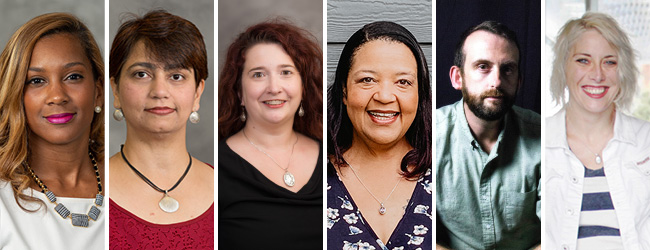
With grant funding to support an in-depth analysis, the group worked to understand how diversity, equity and inclusion (DEI) concepts were threaded throughout the undergraduate curriculum. But in the spring of 2020, the liaisons – much like many others across the country – took a moment for self-reflection.
“After George Floyd was killed, we paused and decided to hold focus sessions on anti-racist pedagogy,” said Patel, who helped form the group and continues to advise their work. “It was an open call to all faculty who were interested in response to what was happening nationally so we could take a closer look at how we could improve expertise in this area and increase the presence of anti-racism work in the curriculum.”
Clinical Instructor Megan Eagle MSN, MPH, FNP-BC, and Clinical Professor Stephen Strobbe, Ph.D., RN, were among the first faculty members to answer the call last spring and joined members of the Inclusive Teaching Liaisons to lead the workshops throughout the summer. The response to these sessions led the committee to refocus their efforts, creating an inventory of DEI materials to assist with course development and forming a new framework to gather feedback from all faculty members.
“We wanted all faculty to participate in this and form a collective understanding of how and why we do this work,” said Patel. “We needed to widen the scope of identities included, because it’s hard to understand the dynamics of race and racism without looking at intersections like ability, sexual identity and class. We have to understand all of it to understand one.”
To that end, Freysinger is an invaluable voice and the only student on the Inclusive Teaching Liaisons. In 2013, five years after earning her BSN from U-M, Freysinger suffered a severe spinal cord injury in a car accident that left her paralyzed from the shoulders down. She later returned to the U-M School of Nursing to earn her master’s degree and is now preparing to complete the DNP program in Leadership, Analytics and Innovation. She is a tireless advocate for accessibility, and she hopes her insight can add new dimensions to the curriculum while creating more opportunities for disabled students to enter the nursing profession.
“I was horrified at what I didn't know when I became disabled, and I’m very passionate about getting disability studies into nursing,” she said. “I think it can teach us a lot about intersectionality. A lot of our patients are going to have disabilities, because 25 % of the U.S. population has a disability. I do a lot of work helping people navigate the health system, and it's horrific what those with disabilities have to go through.”
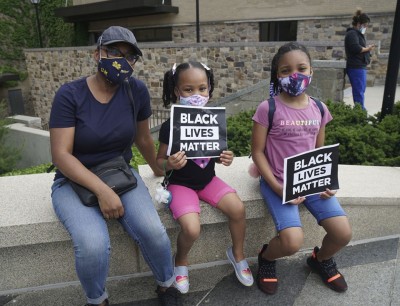 Over the fall 2020 term, the liaisons have been guiding a comprehensive effort to interview every undergraduate faculty member at the School of Nursing. Interviews aim to assess faculty members’ perceptions of DEI, visions for curriculum development, personal experiences and much more. The informal interviews are being led by students and staff, including Freysinger, MSN student Fiyinfoluwa Morenikeji and Megan Belansky, an administrative assistant in the School of Nursing’s DEI Office.
Over the fall 2020 term, the liaisons have been guiding a comprehensive effort to interview every undergraduate faculty member at the School of Nursing. Interviews aim to assess faculty members’ perceptions of DEI, visions for curriculum development, personal experiences and much more. The informal interviews are being led by students and staff, including Freysinger, MSN student Fiyinfoluwa Morenikeji and Megan Belansky, an administrative assistant in the School of Nursing’s DEI Office.
“We want to be humble in our approach to this. Our faculty members are incredibly smart — they have very diverse backgrounds, and we want to respect that throughout this process,” Freysinger said.
“We’re trying to understand everyone’s unique perspective and develop a knowledge base,” Charania explained. “What are some of the strategies we’re already using? What areas can we strengthen? I think this can guide us to make some calculated, data-driven decisions to enhance our curriculum.”
This work is personal for the liaisons. Burns and Tillman-Meakins hold five degrees from the U-M School of Nursing between them, and they acknowledge their work on the committee is about creating a better experience for future generations.
“This is where I was raised as a nurse, and I want to make it better. I’ve talked to many students about how they have felt shut out, so I joined this group to address that,” said Tillman-Meakins. “We need to develop our teaching practice so that everyone not only feels included but knows they can graduate and become part of the nursing profession. In order to create inclusive environments that help people feel safe, we must provide educational opportunities on these issues for faculty, staff and students, because when people feel safe, real learning can occur."
“We have a commitment here because we were students. Some things have changed, and some things have not, and now we have more power to create change as faculty,” said Burns. “Nursing is so powerful; it's a beautiful profession. And I want students who may be experiencing some of the same challenges I went through to know they deserve to be represented.”
Creating spaces for new perspectives
Many other students, faculty and staff at the School of Nursing are driving efforts to create new spaces for more inclusive conversations in nursing and health care.
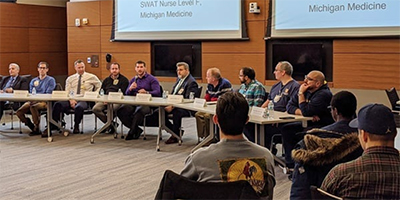
Men in Nursing
Sophomores Josiah Ratts and Neal Hautz recently introduced the Men in Nursing Initiative and are working with Assistant Professor Kevin Joiner, Ph.D., APRN, ANP-BC, to establish a U-M chapter of the American Assembly for Men in Nursing. By collaborating with male nurse leaders at Michigan Medicine, these efforts will build on discussions that took place at the Candid Conversation on Men in Nursing event held in February 2020, addressing the barriers that prevent men from entering the profession.
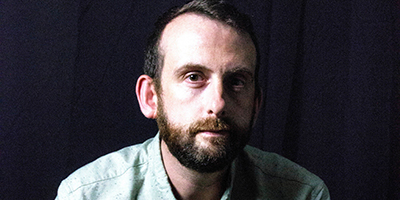
LGBTQ Student Leadership Society
Rushika Patel and Rob Stephenson are facilitating the development of the U-M School of Nursing LGBT Student Leadership Society, with support from faculty mentors including Noël Arring, DNP, Ph.D., RN, OCN, and Terri Voepel-Lewis, Ph.D., RN. The group's growing membership is focused on creating new avenues for LGBTQ+ nursing students to share their experiences and perspectives with one another and the broader campus community, creating new opportunities for connectivity and an outlet for diverse voices to inform U-M School of Nursing priorities.
The Student Leadership Society is just one of the new platforms for LGBTQ+ members of the U-M School of Nursing community, as assistant Professor Akshay Sharma, MBBS, MPH, Ph.D., also organized an LGBT Faculty Networking group last year.
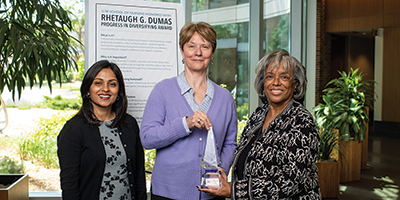
Faculty and Staff of Color Working Group
Assistant Professor Sheria Robinson-Lane, Ph.D., RN, Assistant Professor Emerita Patricia Coleman-Burns, Ph.D., and Research Program Manager Renée Pitter, MPH, are leading the re-establishment of the U-M School of Nursing Faculty and Staff of Color working group. Building on efforts from years past, the group is developing its new strategic plan with a focus on how the School of Nursing can provide better support and new platforms for students, faculty and staff of color to share their thoughts, questions or concerns to effect organizational change and increase awareness on a number of important issues.
Make a gift to support diversity, equity and inclusion efforts at the U-M School of Nursing.





